 Established in 1996, PayPoint is one of the world’s leading specialist payments companies, processing consumer payments through its retail networks, the internet and mobile phones across a wide variety of markets. It was floated on the London Stock Exchange in 2004.
Established in 1996, PayPoint is one of the world’s leading specialist payments companies, processing consumer payments through its retail networks, the internet and mobile phones across a wide variety of markets. It was floated on the London Stock Exchange in 2004.
PayPoint’s clients include many of the UK’s, Ireland’s and Romania’s major energy, cable, mobile and fixed line telephony companies, as well as major parking authorities in the UK, France, Canada and the USA. It also provides online payment facilities for more than 5,500 web-based merchants spanning virtually every market sector.
Over the years, PayPoint has expanded its payment schemes to include transport, financial services, mail order, publishing and school services. PayPoint also supplies self-fill ATM machines, enabling retailers to recycle their cash takings and build store turnover, with consumers spending a proportion of the cash there and then in the store.
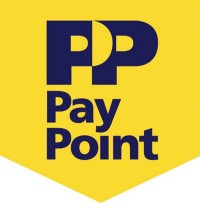 Since 2006, consumers have been able to make cash payments for the BBC TV Licence only at PayPoint agents, while 2009 saw the launch of the Collect+ parcel delivery service, a joint venture between PayPoint and Yodel, formerly Home Delivery Network, through which consumers designate a store for delivery and return of mail order goods. It offers Western Union money transfer services through selected outlets and, earlier this year, it became the only operation in the UK to buy SIM cards direct from operators for re-sale by its agents. Most recently, its stores acted as the conduit for British Gas to give 600,000 of its prepay meter customers a £15 rebate.
Since 2006, consumers have been able to make cash payments for the BBC TV Licence only at PayPoint agents, while 2009 saw the launch of the Collect+ parcel delivery service, a joint venture between PayPoint and Yodel, formerly Home Delivery Network, through which consumers designate a store for delivery and return of mail order goods. It offers Western Union money transfer services through selected outlets and, earlier this year, it became the only operation in the UK to buy SIM cards direct from operators for re-sale by its agents. Most recently, its stores acted as the conduit for British Gas to give 600,000 of its prepay meter customers a £15 rebate.
Mike Igoe, Retail Strategy Director of PayPoint plc, talked to The Grocery Trader.
The Grocery Trader – First of all, Mike, what does your role as PayPoint’s Retail Strategy Director involve?
I mostly concentrate on two main tasks – talking to our retailers to find out what gets them excited about the future and helping them bring those ideas to life; and, secondly, in response to their feedback, developing new products and services that will help our retailers grow their sales and profitability – and also giving them some new retail service ideas they may not have considered. I’m just as energised by finding ways to help retailers reduce costs as I am by helping them increase footfall or sales.
GT – How big is PayPoint worldwide?
PayPoint has operations in the UK, Ireland, Romania, France, the USA and Canada and handles over £9.5 billion from over 550 million transactions annually for more than 6,000 clients and merchants.
GT – How big is the UK in terms of turnover and numbers of transactions? What distinguishes the UK as a market for your services?
The UK is still our largest market, but Romania has really taken off in the last 18 months and the number of transactions processed there almost trebled in the first half of the year. The UK still has a sizeable minority of people who prefer to manage their finances in cash, and we see our role as providing the easiest and most accessible way of doing so.
GT – What proportion of your UK business transactions goes through each of the three payment channels?
The majority goes through the retail networks, but our markets outside the UK are all at early stages of their development and have great growth potential.
GT – How many and which UK retail outlets do you currently collect through?
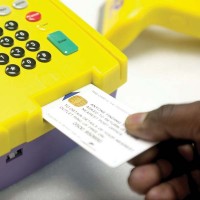 We currently have around 22,500 PayPoint branded outlets throughout the UK, mostly in convenience stores, newsagents, forecourts, off-licences and supermarkets. Multiple retail and symbol groups account for about half the network and include Co-ops, One Stop, Sainsbury’s Local, Martin McColls, Mills, Spar, Londis, Costcutter, Nisa Today’s, Premier, Texaco and many other regional retailers. The balance of the network is stores under independent ownership and members of smaller groups. We also have around 500 agents in Ireland.
We currently have around 22,500 PayPoint branded outlets throughout the UK, mostly in convenience stores, newsagents, forecourts, off-licences and supermarkets. Multiple retail and symbol groups account for about half the network and include Co-ops, One Stop, Sainsbury’s Local, Martin McColls, Mills, Spar, Londis, Costcutter, Nisa Today’s, Premier, Texaco and many other regional retailers. The balance of the network is stores under independent ownership and members of smaller groups. We also have around 500 agents in Ireland.
GT – Does PayPoint cover the whole of the UK?
Over 99% of UK households are situated within one mile of a PayPoint agent in urban areas or five miles in rural areas. About 69% of our customers live within a quarter of a mile of the store.
GT – Which services do you accept payments for in the UK?
We take payments for: electricity and gas, both pre-pay meters and post pay bills; mobile top-up; telephone – cable and calling cards; other bills: water, mail order; housing rents and Council Tax; TV Licences; insurance and savings; transport ticketing; debts, rentals and loans; e-money, prepaid cards and e-vouchers; charitable donations and school meal cards; court and other fines; PayCash internet cash payment; parking charges via mobile phone.
GT – Which of these services are the biggest generators of consumer payments through PayPoint retailers?
We were originally established to enable pre-pay energy meters to be topped up in cash, and this is still an important part of our business. However, our business is now highly diversified, particularly with the growing popularity among local authorities to offer residents cash payment locally at PayPoint rather than forcing them to travel to central cash offices, and for bus companies to offer off-bus ticketing at local shops. As we expand into new markets, we attract new customers to our retailers, often on different types of shopping mission.
GT – What are the benefits to the consumer of paying their bills via PayPoint?
The benefits are convenience and long opening hours. Over two-thirds of PayPoint customers live within a quarter of a mile of a PayPoint agent, and the average agent is open from early morning to late evening seven days a week.
GT – How do consumers view PayPoint agents?
Annual research from Ipsos MORI consistently shows that 97% of consumers are satisfied or very satisfied with the PayPoint service, a level other service businesses would die for. The same number views PayPoint terminals as an essential service that helps cement the retailer into its local community.
GT – How does the commission side of things work?
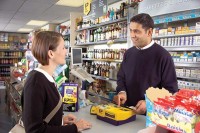 Clients – the companies providing the service – pay a transaction fee to PayPoint. The majority of that is passed on to the retailer in commission. Obviously, the level of commission paid depends on many factors and varies between schemes.
Clients – the companies providing the service – pay a transaction fee to PayPoint. The majority of that is passed on to the retailer in commission. Obviously, the level of commission paid depends on many factors and varies between schemes.
GT – We’ve heard some retailers complain that the commission is too low. How do you respond to that?
PayPoint isn’t simply about commission; it’s about bringing significant recurring footfall into the store to increase sales through visit frequency and average basket spend (50% more over a week). Independent research tells us that two thirds of customers buy something else at the same time, while others return at other times to buy goods and become loyal customers.
The most important factor influencing commission is what our clients pay us. Cash is the most expensive method of payment and an additional cost that they have to absorb despite enormous pressure from customers, shareholders and regulators to keep costs as low as possible. Agents receive more of the fee in commission than we keep ourselves, and it is from this income that we run all the functions required to deliver the service, including the terminal network, contact centre, field support team and back office staff, as well as developing new services and paying for the free materials we send to agents, such as receipt rolls and Point of Sale. We work very hard to keep all these costs as low as possible.
Our focus now is on developing new streams which can command higher commissions for retailers. For example, an Orange value pack of 25 SIM cards offers a potential commission of £112. The recent energy cash-out scheme is another example of where there is higher commission to be earned, with the added bonus of lower banking charges.
GT – What other support do you give to retailers?
PayPoint provides all the technology, training, signage, merchandising and receipt rolls free of charge. We also offer other retail services to reduce costs, such as special deals on refrigeration, insurance and security. Helping retailers reduce their costs is just as important as increasing footfall. We also offer a special bank account with Barclays that reduces charges by up to two-thirds. But, of course, they do need to sign up for it!
GT – Are consumers charged to their pay bills through PayPoint?
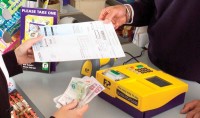 No, the service is provided free of charge to consumers.
No, the service is provided free of charge to consumers.
GT – What technology do you provide to retailers? How does this kit link up with the retailer’s existing EPOS system?
The terminal and scanner are free. Additional hardware such as credit/debit pads and ATMs incur some charges. The new PPoD system, which is currently being rolled out, fully integrates PayPoint into the retailer’s EPoS system. That means the customer is able to do a PayPoint transaction while putting grocery items through the same checkout in the same purchase. PPoD also eliminates reconciliation issues.
GT – What other consumer services do you provide?
We offer a broad range of retail-based services including ATMs, SIM cards, credit/debit facilities and international money transfer with Western Union. Our value added content and services are what differentiate the PayPoint proposition from competitors. Our data confirms that the more services taken, the higher the number of payments through the terminal.
GT – How do your ATMs work?
PayPoint is a member of LINK as an Independent ATM Deployer (IAD) and operates more than 2,400 machines across the UK on a self-fill basis. Consumers usually pay a surcharge, or ‘convenience fee’, for each withdrawal, which is shared equally with the retailer. Retailers use their own cash to fill the machines, so benefit from recycling the cash taken in their store, some of which is then spent in the store on the same visit, and from reduced banking charges.
GT – Which SIM cards do you sell?
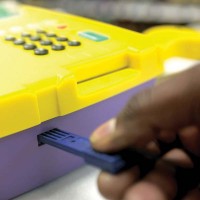 We sell SIM cards for most of the major mobile networks and MVNOs (mobile virtual network operators) – Vodafone, O2, Virgin, T-Mobile, Orange, 3, Tesco, Vectone, Lyca, Lebara, Nomi-star, Now Mobile and GT Mobile. This initiative gives retailers full control over their stock for the first time, as well as full recognition and reward for activations.
We sell SIM cards for most of the major mobile networks and MVNOs (mobile virtual network operators) – Vodafone, O2, Virgin, T-Mobile, Orange, 3, Tesco, Vectone, Lyca, Lebara, Nomi-star, Now Mobile and GT Mobile. This initiative gives retailers full control over their stock for the first time, as well as full recognition and reward for activations.
GT – Please explain your new parcel service.
With Collect+, consumers can return unwanted mail order goods through participating PayPoint stores – around 3,400 throughout the UK and growing. Mail order and online retailers can offer the option of having goods delivered to a participating PayPoint retailer, thereby avoiding failed delivery (around 20% first time) and inconvenient trips to the carrier’s depot; small businesses can despatch their goods at a PayPoint retailer for delivery to another PayPoint retailer nominated by the customer; and consumers can send parcels to each other. Collect+ is used by a wide range of mail order and online retailers and is a preferred option on eBay.
GT – Are you looking to expand the UK network further?
Yes. On top of the current network of 22,000 retailers, we have an active database of several thousand more who have either registered interest or applied to become a PayPoint agent.
GT – What are the criteria for retailers to qualify to be a PayPoint agent?
We look at a range of criteria, including whether we already have any agents nearby and the likely demand for cash payment services in the area. We have an experienced team in the field and often rely on their opinions of a shop and their local knowledge. We also have to be sure of the retailer’s financial viability as customers are entrusting them with their cash, so have to be confident it will reach the intended recipient.
GT – You’ve most recently handled the Cash Out for British Gas, in which 600,000 of their prepay meter customers were given a £15 rebate which they could only get at PayPoint outlets. How did that work?
Our network has the greatest coverage in those areas with the highest concentrations of BG pre-pay customers, and we’d successfully completed a couple of smaller schemes for other energy clients. The process was relatively straightforward – a letter was sent to everyone qualifying for the rebate to tell them where they could get it. The most important element was communication with our agents, because cash-out is such a departure from what they’re used to. Owners and managers were mostly well aware of the benefits to them, but they had to ensure that their staff were aware of the scheme. In the event, it went extremely smoothly, and we received many calls and emails from retailers welcoming the scheme and urging us to do more of them. The reason for that is easy to see: it brought in new customers, including those who normally charge up their electricity elsewhere. Many customers spent some or all of the cash in the shop, they earned a healthy 15p commission on every transaction and banking charges were reduced.
GT – What external factors do you see affecting the way consumers make payments?
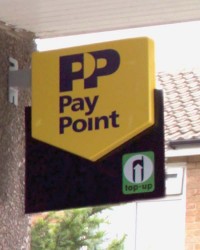 Governments have made repeated attempts over the last few years to encourage more people to have bank accounts and use direct debits to pay their bills, all in the name of financial inclusion. In reality, there are many people – even among those with bank accounts – who prefer to manage their finances in cash and who are deeply distrustful of direct debits. When living on a very tight budget where every penny counts, when you know that the cash in your hand is all the money you have to get through the week, that gives you much greater control over what goes out. One of the keys to managing finances in this way is to pay little but often, and that’s what PayPoint gives customers the freedom to do. The recession affected people in different ways; some turned to their cards, and probably now regret it, while others turned more to cash. I’m sure the same will happen over the next few years, but I don’t expect huge changes in overall spending or payment habits.
Governments have made repeated attempts over the last few years to encourage more people to have bank accounts and use direct debits to pay their bills, all in the name of financial inclusion. In reality, there are many people – even among those with bank accounts – who prefer to manage their finances in cash and who are deeply distrustful of direct debits. When living on a very tight budget where every penny counts, when you know that the cash in your hand is all the money you have to get through the week, that gives you much greater control over what goes out. One of the keys to managing finances in this way is to pay little but often, and that’s what PayPoint gives customers the freedom to do. The recession affected people in different ways; some turned to their cards, and probably now regret it, while others turned more to cash. I’m sure the same will happen over the next few years, but I don’t expect huge changes in overall spending or payment habits.
GT – Finally, where do you see PayPoint going from here? What other services do you plan to add?
We have always been innovators; there’s always something round the corner that others copy a few months later. PPoD will probably be the most significant development for our agents since PayPoint was first launched, and I’m looking to increase the range of Support Services, for instance, into shop fitting. Otherwise – watch this space!
PayPoint PLC
Tel: 01707 600 300




Comments are closed.